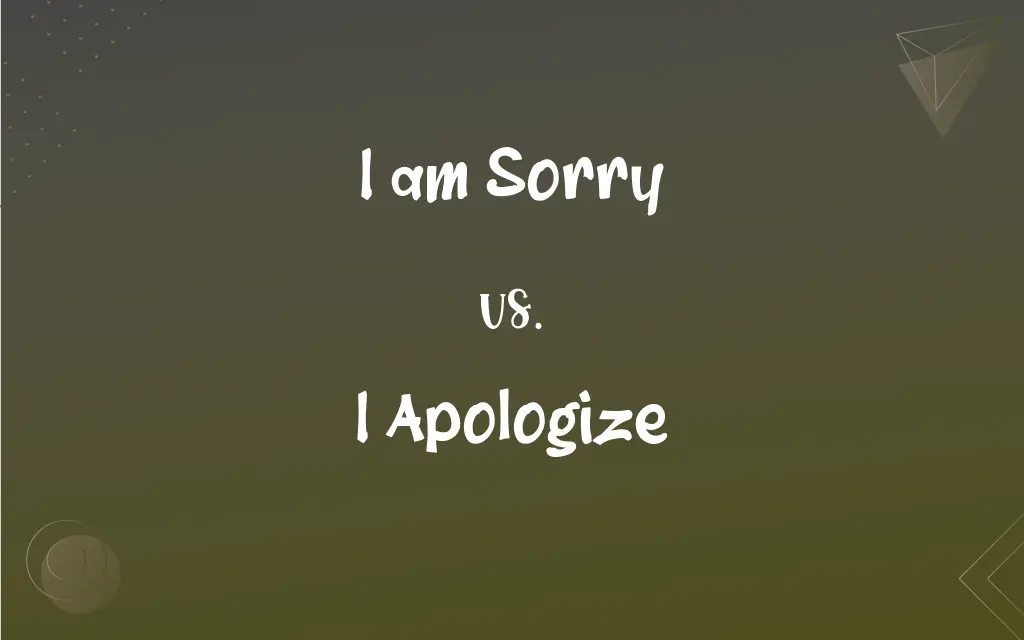I am Sorry vs. I Apologize: What's the Difference?
Edited by Aimie Carlson || By Harlon Moss || Updated on October 25, 2023
"I am sorry" expresses regret; "I apologize" conveys a formal acknowledgment of wrongdoing.

Key Differences
"I am sorry" and "I apologize" are both phrases commonly used to express regret, but they differ slightly in tone and usage. "I am sorry" is often perceived as more personal and sincere, conveying genuine regret or remorse for one's actions or words. It's a phrase that is embedded with empathy, indicating that the speaker not only recognizes the wrongdoing but also feels the pain it might have caused.
On the other hand, "I apologize" has a more formal tone, making it suitable for professional or official settings. This phrase explicitly acknowledges the wrongdoing and takes responsibility for it. It's a direct declaration of one's accountability, without necessarily conveying the emotional component associated with "I am sorry."
Both phrases are essential tools in the art of communication, allowing for reconciliation and the mending of relationships. While "I am sorry" touches upon the emotional aspect of an error, focusing on the feelings of the other party, "I apologize" centers more on the person admitting their mistake, ensuring they are held accountable.
It's worth noting that the impact of either phrase can vary based on cultural or regional differences. In some cultures or situations, a simple "I am sorry" may be preferred as it feels more heartfelt, whereas in others, "I apologize" might be more valued for its directness.
Comparison Chart
Tone
Personal and sincere
Formal
ADVERTISEMENT
Focus
Emotion and empathy towards the affected party
Taking responsibility for the wrongdoing
Usage
Personal interactions
Professional or official settings
Emotional Component
Conveys regret and remorse
Acknowledgment without necessarily conveying emotion
Cultural Variation
Might be preferred for its heartfelt nature
Might be preferred for its directness
I am Sorry and I Apologize Definitions
I am Sorry
A means to seek forgiveness.
I am sorry; can you forgive me?
ADVERTISEMENT
I Apologize
An expression devoid of emotional undertones.
I apologize for the error in the report.
I am Sorry
An acknowledgment of a mistake.
I am sorry, I misunderstood.
I Apologize
A declaration of responsibility.
I apologize for the inconvenience caused.
I am Sorry
An expression of regret.
I am sorry for being late.
I Apologize
A means to mend professional relationships.
I apologize for the delay in response.
I am Sorry
A way to show empathy.
I am sorry to hear about your loss.
I Apologize
An acknowledgment in official settings.
I apologize for any confusion.
I am Sorry
A phrase to convey sympathy.
I am sorry for what you're going through.
I Apologize
A formal expression of regret.
I apologize for the oversight.
FAQs
Is "I apologize" suitable for official or business settings?
Yes, it's often used in professional contexts for its formal tone.
Can I use both phrases together?
Yes, combining them can emphasize regret, e.g., "I am sorry, I apologize."
Which phrase is more commonly used in American English?
Both are common, but "I am sorry" might be used more frequently in informal settings.
Can "I apologize" be used in personal settings?
Yes, but it might come off as more formal than "I am sorry."
Does saying "I apologize" always mean I'm at fault?
It typically implies taking responsibility for an action or statement.
How do I decide which phrase to use?
Consider the context, relationship with the listener, and the emotion you want to convey.
Does the effectiveness of the phrase depend on the situation?
Yes, context matters. "I am sorry" might feel more genuine personally, while "I apologize" may be apt professionally.
When is "I am sorry" more appropriate than "I apologize"?
In intimate or personal settings, "I am sorry" might be more fitting due to its emotional undertone.
Which phrase is more personal, "I am sorry" or "I apologize"?
"I am sorry" is generally considered more personal.
Does "I am sorry" imply admitting a mistake?
It can, but it can also just express sympathy or empathy.
Is "I am sorry" always about wrongdoing?
No, it can also be an expression of sympathy.
Can "I apologize" be seen as insincere?
Depending on context and delivery, it can come off as less emotionally involved.
Is one phrase stronger than the other?
Strength depends on context; "I am sorry" can be emotionally stronger, while "I apologize" can be more direct.
Which phrase conveys more emotion?
"I am sorry" typically conveys more emotion and empathy.
Why might someone choose "I apologize" over "I am sorry"?
For its directness and formality, especially in official settings.
Can these phrases be used interchangeably?
Often, yes, but considering the tone and context is essential.
Which phrase is more about feeling than action?
"I am sorry" leans more towards feeling, while "I apologize" is about action.
Can "I apologize" be seen as distancing oneself from the error?
Sometimes, as it's a more formal acknowledgment without necessarily conveying personal remorse.
Are there cultural differences in using these phrases?
Yes, the preferred phrase can vary based on cultural or regional nuances.
Are there other phrases similar to "I am sorry" and "I apologize"?
Yes, like "My apologies," "Pardon me," or "Excuse me."
About Author
Written by
Harlon MossHarlon is a seasoned quality moderator and accomplished content writer for Difference Wiki. An alumnus of the prestigious University of California, he earned his degree in Computer Science. Leveraging his academic background, Harlon brings a meticulous and informed perspective to his work, ensuring content accuracy and excellence.
Edited by
Aimie CarlsonAimie Carlson, holding a master's degree in English literature, is a fervent English language enthusiast. She lends her writing talents to Difference Wiki, a prominent website that specializes in comparisons, offering readers insightful analyses that both captivate and inform.































































